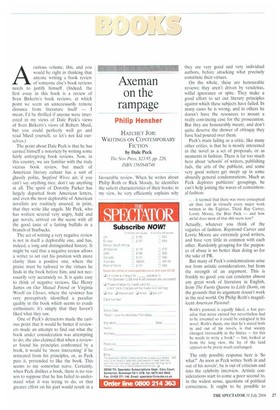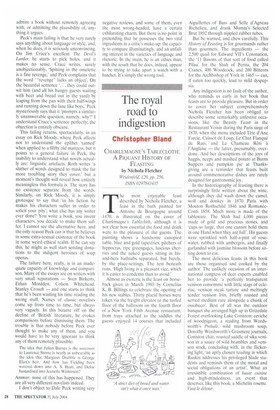Axeman on the rampage
Philip Hensher
HATCHET JOB: WRITINGS ON CONTEMPORARY FICTION by Dale Peck The New Press, $23.95, pp. 228, ISBN 1565848748 Acurious volume, this, and you would be right in thinking that anyone writing a book review of someone else's book reviews needs to justify himself. (Indeed, the first essay in this book is a review of Sven Birkerts's book reviews, at which point we seem an unnecessarily remote distance from literature itself — I mean, I'd be thrilled if anyone were interested in my views of Dale Peck's views of Sven Birkerts's views of Robert Musil, but you could perfectly well go and read Musil yourself, so let's not kid ourselves.)
The point about Dale Peck is that he has earned himself a notoriety by writing some fairly unforgiving book reviews. Now, in this country, we are familiar with the truly vicious book review, but much of American literary culture has a sort of glassily polite, Step ford Wives air; if you can't say anything nice, don't say anything at all. The spirit of Dorothy Parker has largely departed from American letters, and even the most deplorable of American novelists are routinely assured, in print, that they write like angels. Mr Peck, who has written several very angry, bald and gay novels, arrived on the scene with all the good taste of a farting buffalo in a branch of Starbucks.
The act of writing a very negative review is not in itself a deplorable one, and has, indeed, a long and distinguished history. It might be said that a negative review allows a writer to set out his position with more clarity than a positive one, where the praise must be tailored to the virtues he finds in the book before him, and not necessarily very accurately so. It is quite easy to think of negative reviews, like Henry James on Our Mutual Friend or Virginia Woolf on Ulysses, where the reviewer has very perceptively identified a peculiar quality in the book which seems to evade enthusiasts; it's simply that they haven't liked what they saw.
One of Peck's detractors made the curious point that it would be better if reviewers made an attempt to find out what the book under consideration was attempting to do; she also claimed that when a reviewer found his principles confronted by a book, it would be 'more interesting' if he retreated from his principles, or, as Peck puts it, pretended to like the book. This seems to me somewhat naive. Certainly, when Peck dislikes a book, there is no reason to suppose that he has failed to understand what it was trying to do, or that greater effort on his part would result in a favourable review, When he writes about Philip Roth or Rick Moody, he identifies the salient characteristics of their books; in my view, he very efficiently explains why they are very good and very individual authors, before attacking what precisely constitute their virtues.
On the whole, these are honourable reviews; they aren't driven by vendettas, wilful ignorance or spite. They make a good effort to set out literary principles against which these subjects have failed. In many cases he is wrong, and in others he doesn't have the resources to mount a really convincing case for the prosecution. But they are honourably meant, and don't quite deserve the shower of obloquy they have had poured over them.
Peck's main failing as a critic, like many other critics, is that he is mostly interested in the novel as a set of proposals, or as moments in fashion. There is far too much here about 'schools' of writers, publishing fads, the arts of the publicist, and some very good writers get swept up in some absurdly general condemnations. Much as Peck deplores publicists' groupings, he can't help joining the waves of conventional fashion:
... it seemed that there was more conceptual air than text in virtually every major work written in the Eighties. Think Ray Carver, Lorrie Moore, the Brat Pack — and how awful does most of that shit seem now?
Actually, whatever you think of the vagaries of fashion, Raymond Carver and Lorrie Moore are extremely good writers, and have very little in common with each other, Randomly grouping for the purposes of abuse is no better than doing so for the sake of PR.
But many of Peck's condemnations arise not from artistic considerations, but from the strength of an argument. This is frankly no good: you can condemn almost any great work of literature in English, from The Faerie Queene to Little Dotrit, on the grounds that its argument doesn't work in the real world. On Philip Roth's magnificent American Pastoral:
Roth's pastoral is equally faked, a lost paradise that never existed but nevertheless had to be invented so it could be eulogised in his novel. Roth's thesis, one that he's stated both in and out of his novels, is that society changed irrevocably in the Sixties — for this he needs to write a book? — but, looked at from the long view, the lay of the land appears to he pretty much unchanged.
The only possible response here is 'So what?' As soon as Peck writes 'both in and out of his novels', he is out of criticism and into the celebrity interview. Artistic considerations start to come a poor second to, in the widest sense, questions of political correctness. It ought to be possible to admire a book without remotely agreeing with, or admitting the plausibility of, anything it argues.
Peck's main failing is that he very rarely says anything about language or style, and, when he does, it is seriously unconvincing. On Jim Crace's excellent The Devil's Larder, he starts to pick holes, and it makes no sense. Crace writes, surely unobjectionably, 'Spitting in the omelette is a fine revenge,' and Peck complains that the word "revenge" lacks an object'. On the beautiful sentence `. . . they could outwit him (and all his hungry guests waiting with beer and bread out in the yard) by leaping from the pan with their half-wings and running down the lane like boys,' Peck mysteriously says that it 'prompts a similarly unanswerable question, namely, why?' I understand Crace's sentence perfectly; the objection is entirely obscure.
This failing returns, spectacularly, in an essay on Rick Moody, where Peck affects not to understand the epithet 'tanned' when applied to a filthy old mattress, but it points to a general failure in Peck, the inability to understand what novels actually are: linguistic artefacts. Roth writes 'a slather of words designed to mask the far more troubling story they cover,' but a moment's thought will reveal how entirely meaningless this formula is. The story has no existence separate from the words. Similarly, on Rick Moody, it is simply grotesque to say that 'in his fiction he makes his characters suffer in order to solicit your pity': what else has any writer ever done? You write a book, you invent characters, you decide to make them suffer. I cannot see the alternative here, and the only reason Peck can is that he believes in some extra-textual existence of the book in some weird ethical realm. If he can say this, he might as well start sending donations to the indigent heroines of soap operas.
The failure here, really, is in an inadequate capacity of knowledge and comparison. Many of the essays are on writers with very small reputations — Sven Birkerts, Ethan Mordden, Colson Whitehead, Stanley Crouch — and one starts to think that he's been wasting his time reading the wrong stuff. Names of classic novelists come up from time to time, but always very vaguely. In this bizarre riff on the decline of 'British' literature, he evokes comparisons before dismissing them. The trouble is that nobody before Peck ever thought to make any of them, and you would have to be very ignorant to think any of them remotely plausible:
The idea that Julian Barnes is the successor to Laurence Sterne is nearly as unbearable as the idea that Margaret Drabble is George Eliot's heir. And how has Fielding been watered down into A. S. Byatt, and Defoe bastardised into Jeanette Winterson?
Answer: none of this has happened. They are all very different novelists indeed. I don't object to Dale Peck writing very negative reviews, and some of them, even the most wrong-headed, have a certain exhilarating charm. But there is no point in pretending that he possesses the two vital ingredients in a critic's make-up: the capacity to compare illuminatingly, and an unfailing interest in the varieties of language and rhetoric. In the main, he is an ethics man. with the result that he does, indeed, appear to be trying to take apart a watch with a hatchet. It's simply the wrong tool.



























































 Previous page
Previous page